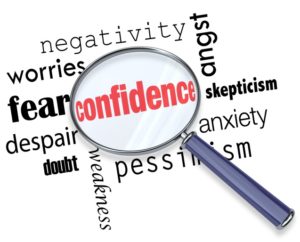 Confidence is the second mental “muscle” that I explore in my upcoming Prime Sport 101: Train Your Mind like a Champion online mental training course. I define confidence as how strongly you believe in your ability to perform your best and achieve your athletic goals. Confidence is the most important mental muscle because you may have all of the ability in the world to perform your best, if you don’t believe in that ability, you won’t use that ability. For example, a gymnast may be physically and technically capable of executing a back somersault with a full twist on the floor exercise, but he won’t attempt the skill in a meet if doesn’t have the confidence that he can successfully execute the skill.
Confidence is the second mental “muscle” that I explore in my upcoming Prime Sport 101: Train Your Mind like a Champion online mental training course. I define confidence as how strongly you believe in your ability to perform your best and achieve your athletic goals. Confidence is the most important mental muscle because you may have all of the ability in the world to perform your best, if you don’t believe in that ability, you won’t use that ability. For example, a gymnast may be physically and technically capable of executing a back somersault with a full twist on the floor exercise, but he won’t attempt the skill in a meet if doesn’t have the confidence that he can successfully execute the skill.
Prime Confidence
Prime confidence is a deep, lasting, and resilient belief in your ability. Prime confidence keeps you positive, motivated, intense, focused, and emotionally in control when you need to be. You aren’t negative and uncertain in difficult competitions and you’re not overconfident in easy competitions. Prime confidence also encourages you to seek out pressure situations and to view difficult conditions and tough opponents as challenges to pursue. Prime confidence enables you to perform at your highest level consistently.
Why Athletes Lose Confidence
Anything that counters your belief in your ability to achieve your goals will hurt your confidence. The greatest disruption to confidence is failure. Failure can mean making mistakes in a competition, for example, missing an easy header in soccer or falling on a double axel in figure skating. Failure will cause you to lose faith in your ability and cause you to become tentative or cautious. Failure can also mean having poor results in recent competitions. There is nothing more harmful to confidence than failure because it provides evidence that any confidence you may have is unjustified.
Confidence is a Muscle
A misconception that many athletes have is that confidence is something that is inborn or that if you don’t have it at an early age, you will never have confidence. In reality, confidence is a muscle that we all have that, much like physical muscles, can be strengthened through training.
Confidence Challenge
It’s easy to stay confident when you’re performing well, when the conditions are ideal, and when you’re competing against someone whom you’re better than. The real test of confidence, however, is how you respond when things aren’t going your way. I call this the Confidence Challenge. What separates the best from the rest is that the best athletes are able to maintain their confidence when they’re not at the top of their game. By staying confident, they continue to work hard rather than give up because they know that, in time, their performance will come around.
Five Keys to Prime Confidence
I have identified five “exercises” to strengthen your confidence muscle. Each exercise alone can build your confidence, but if you use all of them together, you’ll find your confidence growing stronger and more quickly.
Preparation breeds confidence. Preparation is the foundation of confidence. This preparation includes the physical, technical, tactical, equipment, and mental parts of your sport and means putting in the necessary time and effort into every aspect of your training. If you have developed these areas as fully as you can, you will have faith that you will be able to use those capabilities gained from preparation to perform as well as you can in competition. The more of these areas you fully address in your preparations, the more confidence you will breed in yourself. My goal with the athletes I work is, when they arrive at every competition, that they can say, “I’m as prepared as I can be to achieve my goals.”
Mental tools reinforce confidence. When I work with athletes, I encourage them to create a mental “toolbox,” inside of which they will put essential mental tools that they will need in training and competition. Just like having a spare tire, tire iron, and jack if you get a flat tire while driving, the tools in your mental toolbox are available when you have breakdowns in your sport, for example, you get tired at the end of a competition, you have a period of poor play, or you have a close call go against you. Tools that you can place in your mental toolbox can include inspirational thoughts and images to bolster your motivation, positive self-talk and body language to fortify your confidence, intensity control to combat confidence-depleting anxiety, keywords to maintain focus and avoid distractions, and emotional-control techniques to calm yourself under pressure.
Adversity ingrains confidence. Like most athletes, you probably love to train in ideal conditions when you’re healthy, rested, and on your game. But how often do you compete under ideal conditions? Probably rarely. More often than not, the worst conditions come out when you want them least. But it isn’t the conditions that determine who succeeds and who fails because, for example, two athletes with similar ability can face the same conditions, but view and respond to them entirely differently. Athlete A may see them as a threat that causes negativity and anxiety. Athlete B sees those same conditions as a challenge and becomes motivated and excited. So who do you think is going to be more successful?
To more deeply ingrain confidence, you should expose yourself to as much adversity as possible in training. Adversity can be environmental obstacles such as bad weather during soccer game or a strong headwind in a running race. Adversity can also involve your opponent, for example, who is a little better than you or who has a style of play that frustrates you.
Support bolsters confidence. It’s difficult to achieve success on your own. The very best athletes in every sport have many people supporting them. There will be times when things are just not going well and it helps to have people, for example, family, friends, coaches, and teammates, to whom you can turn for support and encouragement. Though your confidence may wax and wane depending on how you’re feeling, the quality of your training, and your recent competitive results, you want people in your life who you can count on to give you a “booster shot” of confidence, for example, have a coach say, “I know you can do it” or a friend tell you, “Hang in there. Things will turn around.”
Success validates confidence. All of the previous steps in building confidence will go for naught if you don’t then perform well and achieve your goals. Success validates the confidence you have developed in your ability; it demonstrates that your belief in your ability is well-founded. Success further strengthens your confidence, making it more resilient in the face of adversity and poor performance. Success also rewards your efforts to build confidence, encouraging you to continue to work hard and develop your capabilities.
But when I talk about success, I don’t mean just competitive success, at least not right away. You can’t just go out and have a big success to give you confidence. Your initial goal is to create little “victories” every day in training. When you walk away from practice, you should be able to say that you just “won” that day by doing what you needed to do (e.g., work hard, make a technical improvement) to achieve your long-term goals. With each small victory in training that you accumulate, you move one step closer to that big victory, namely, achieving your competitive goals.
To learn more about confidence and other mental muscles that are necessary for athletic success, enroll in my Prime Sport 101 online mental training course.
The first session begins August 1st and only a limited number of slots are available, so register now.
Team discounts are available. TEAM BONUS: Coaches may attend AT NO COST when 15 or more members of your team register.
To learn more and to register, visit the Prime Sport 101 launch page. Or call (415.322.8425) or email me for more information.

